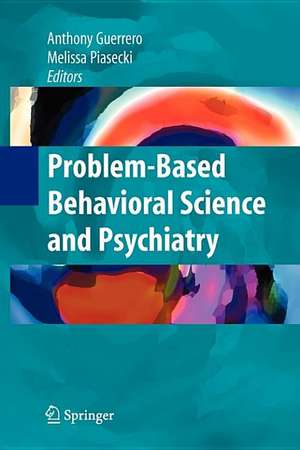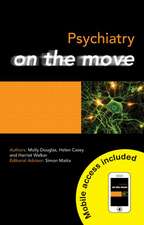Problem-based Behavioral Science and Psychiatry
Editat de Anthony Guerrero, Melissa Piaseckien Limba Engleză Paperback – 29 oct 2010
This book presents simulated patient cases in psychiatry and behavioral science, providing a real-world context for students and graduates in these areas. It introduces the topics described below through detailed case vignettes using a model of problem-based learning called progressive disclosure. Sample diagrams known as mechanistic case diagrams illustrate the neurobiological mechanisms underlying behavioral symptoms and show how behavioral and psychosocial factors impact on patient care.
Preț: 599.35 lei
Preț vechi: 630.89 lei
-5% Nou
Puncte Express: 899
Preț estimativ în valută:
114.69€ • 120.04$ • 95.45£
114.69€ • 120.04$ • 95.45£
Carte tipărită la comandă
Livrare economică 31 martie-14 aprilie
Preluare comenzi: 021 569.72.76
Specificații
ISBN-13: 9781441926531
ISBN-10: 1441926534
Pagini: 480
Ilustrații: XVI, 462 p.
Dimensiuni: 155 x 235 x 25 mm
Greutate: 0.67 kg
Ediția:Softcover reprint of hardcover 1st ed. 2008
Editura: Springer
Colecția Springer
Locul publicării:New York, NY, United States
ISBN-10: 1441926534
Pagini: 480
Ilustrații: XVI, 462 p.
Dimensiuni: 155 x 235 x 25 mm
Greutate: 0.67 kg
Ediția:Softcover reprint of hardcover 1st ed. 2008
Editura: Springer
Colecția Springer
Locul publicării:New York, NY, United States
Public țintă
Professional/practitionerCuprins
How to Use This Book.- Human Behavior.- Childhood Development.- Effects of Experience on Brain Development.- Learning Principles of Human Behavior.- Sexuality Throughout the Life Cycle.- Adaptation and Coping in a Medical Setting.- Violence and Abuse.- Healthcare Principles.- The Physician–Patient Relationship.- Ethics and Professionalism.- Adherence in Medicine.- Stress and Health.- Health Care 101.- Stigma and Medicine.- Culture, Ethnicity, and Medicine.- Quantitative Measures in Healthcare.- Death, Dying, and End-of-Life Care.- Behavioral Neuroscience and Clinical Psychiatry.- Basic Principles of Evaluation: Interviewing, Mental Status Examination, Differential Diagnosis, and Treatment Planning.- Disorders of Childhood.- Substance Use Disorders.- Psychotic Disorders.- Mood Disorders and Suicide.- Anxiety Disorders.- Somatoform Disorders.- Personality Disorders.- Cognitive Disorders.- Sleep Disorders.- Eating Disorders.- Sexual Disorders.- Other Disorders.
Recenzii
From the reviews:"This book discusses problem-based learning (PBL) methods and how to apply them when learning behavioral science and psychiatry. … written for medical students and other students studying psychiatry and behavioral science. I would include anyone interested in PBL methods, as they may find it interesting as a way to learn about this technique. … Each chapter has an extensive bibliography. … A comprehensive index ends the book. … for those who wish to learn about this teaching approach, this is a good book." (William Miles, Doody’s Review Services, January, 2009)"...this unique book first provides cases to use as teaching tools and then ... emphasizes the use of problem-based learning methods to master the contents of teaching. ...an interesting and important book for teaching the principles of behavioral science and psychiatry. Unique in its presentation and format, the book is an excellent alternative for teachers of medical students, residents, and fellows. It is an important addition to the many texts discussing psychiatry in primary care medicine and general hospital psychiatry, as well as a useful volume for beginners attempting to master an understanding of this complex discipline of medicine. The authors have offered an innocative case method approach as a teaching paradigm from which teachers have much to gain." (James J. Strain, MD, J Clin Psychiatry 70:8, August 2009)
Notă biografică
Dr. Guerrero is Associate Professor of Psychiatry and Pediatrics, Vice-Chair for Education and Training in the Department of Psychiatry, Director of Medical Student Education in Psychiatry, and Director of the Child and Adolescent Psychiatry Division at the University of Hawaii John A. Burns School of Medicine. He has published in the areas of medical student education and problem-based learning, Asian and Pacific Islander mental health, and the interface between primary care and psychiatry.
Dr. Piasecki is Associate Professor of Psychiatry and Vice Chair for Education at University of Nevada School of Medicine where she works extensively with medical students and residents. She has published on the Physician-Patient relationship and a number of clinical topics.
Dr. Piasecki is Associate Professor of Psychiatry and Vice Chair for Education at University of Nevada School of Medicine where she works extensively with medical students and residents. She has published on the Physician-Patient relationship and a number of clinical topics.
Textul de pe ultima copertă
Problem-Based Behavioral Science and Psychiatry
Edited by Anthony Guerrero, University of Hawaii, Honolulu
Melissa Piasecki, University of Nevada, Reno
In keeping with the growing emphasis on psychiatry in the medical school curriculum, problem-based learning (PBL) offers students a unique patient-centered, multidisciplinary approach to study and the synthesis of knowledge. The first text fully consistent with PBL models and methods, Problem-Based Behavioral Science and Psychiatry is a clinically robust resource for both the medical and the behavioral science student. Over 40 contributors, many themselves graduates of PBL medical schools, apply problem-based learning methods to specific psychiatric disorders, general clinical issues, and bedrock physician skills such as the intake interview and treatment planning.
The book’s fictional case vignettes illustrate typical patient scenarios, providing real-world context for content areas, and accompanying case diagrams show the relationships between patient behavior and underlying neurobiological structures. Each student-friendly section ends with helpful review questions.
A sampling of the content areas covered:
Edited by Anthony Guerrero, University of Hawaii, Honolulu
Melissa Piasecki, University of Nevada, Reno
In keeping with the growing emphasis on psychiatry in the medical school curriculum, problem-based learning (PBL) offers students a unique patient-centered, multidisciplinary approach to study and the synthesis of knowledge. The first text fully consistent with PBL models and methods, Problem-Based Behavioral Science and Psychiatry is a clinically robust resource for both the medical and the behavioral science student. Over 40 contributors, many themselves graduates of PBL medical schools, apply problem-based learning methods to specific psychiatric disorders, general clinical issues, and bedrock physician skills such as the intake interview and treatment planning.
The book’s fictional case vignettes illustrate typical patient scenarios, providing real-world context for content areas, and accompanying case diagrams show the relationships between patient behavior and underlying neurobiological structures. Each student-friendly section ends with helpful review questions.
A sampling of the content areas covered:
- Childhood development and brain development.
- Major psychological illnesses, including personality, mood, anxiety, and psychotic disorders.
- Stress, substance abuse, and violence.
- Eating, sleep, and sexual disorders.
- Coping skills and treatment compliance.
- End-of-life care.
- PLUS chapters on cultural sensitivity, ethical concerns, and the physician/patient relationship.
Caracteristici
Problem-based format with compelling patient scenarios addressing important topics in behavioral science and psychiatry Mechanism-based diagrams to illustrate the complex connections between basic and clinical science Review questions at the end of each section Includes supplementary material: sn.pub/extras







